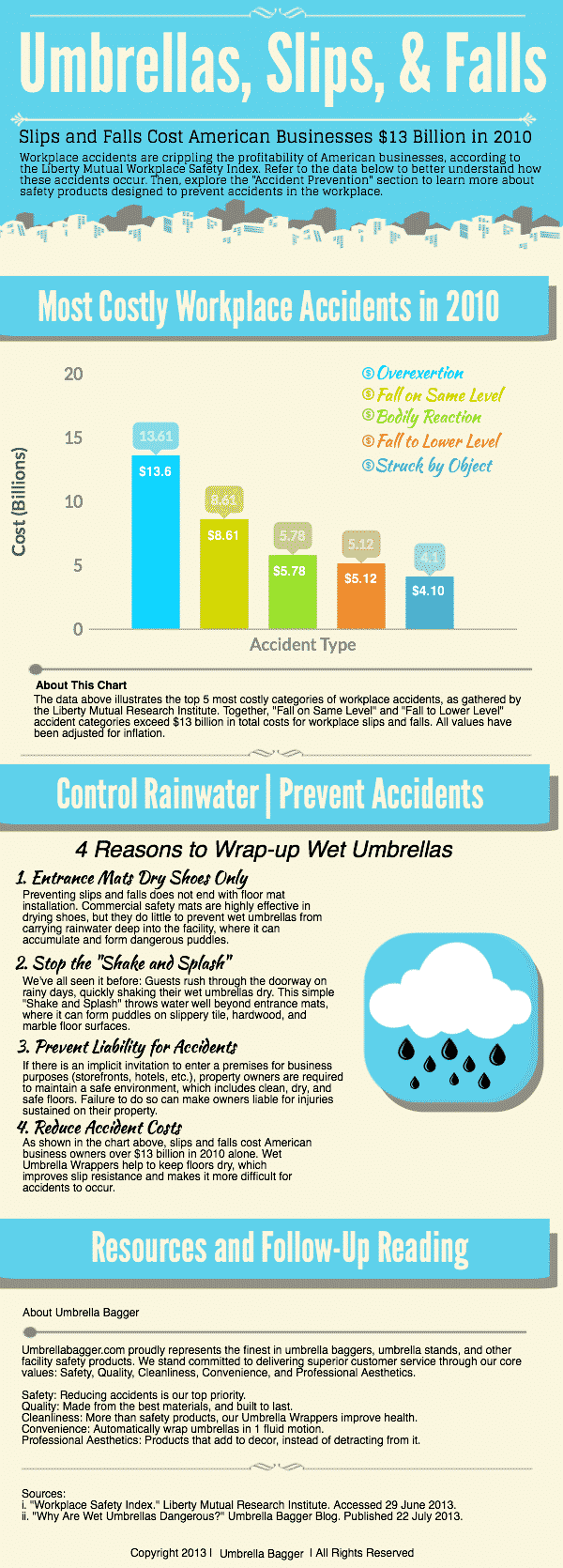Free Infographic: Prevent Slippery Floors, Reduce Accidents
Prevent slipper floors, and reduce in-store accidents seems to be the main message behind a new study. After all, guests are only human, and mis-steps that lead to accidents are a reality that must be addressed. Managers and maintenance personnel are likewise prone to misjudging certain risks, cleaning protocols, and other aspects of facility safety. Moreover, dangerous conditions can form quickly and cause accidents long before a maintenance team has time to respond and clean in a reasonable manner. One such scenario includes rainwater accumulation in unlikely places.
Rainwater, snow, and other debris accumulation is most dangerous when it occurs in unlikely places for 1 main reason: It’s hard to spot. For maintenance personnel, accumulation that occurs beyond floor mats or along interior corridors might not be recognized during normal rounds. And for guests, such accumulation can be unexpected and, in some cases, very difficult to see.
Slipper Floors Cost Business Owners Billions
According to the Liberty Mutual Research Institute, slip and fall accidents cost American businesses an estimated $13 billion in total costs. Among those categories of accidents are overexertion, fall on same level, bodily reaction, fall to lower level, and struck by object (such as moving machinery or a dropped tool). The costs illustrated in the infographic above were originally published in the Institute’s Workplace Safety Index for 2010.
Most alarmingly, however, is a figure that is not illustrated above: The cost of slip and fall accidents has actually increased between the years of 1998 and 2008, as reported by Liberty Mutual. Also important to note is that costs for the other top 10 categories of at-work injury all decreased over the same time period.
These numbers demonstrate a simple truth: Slip and fall accidents remain a problem for American business owners. Be it ineffective safety products, lack of proper cleaning protocol, unpredictable weather, or some combination of each of these variables, slip and fall accidents are a costly part of doing business that is preventable.
How to Eliminate Slippery Floor Surfaces
The best way to prevent accidents due to rainy day weather is to take a 3-pronged approach to rainwater accumulation. This includes:
1. Anticipate wet shoes.
Rainy days inevitably cause visitors’ shoes to become wet and dirty with debris. To prevent slips and falls, use indoor and outdoor commercial floor mats to aggressively clean debris and wetness from visitors’ shoes.
2. Remember: Wet coats track water past mats.
Shoes are not the only thing that needs tending to, however. Wet coats can easily track water well beyond floor mats, which can cause dangerous accumulation in hard-to-see places. To combat this problem, use coat racks and “coat checks” to encourage guests to leave wet coats at the entryway.
3. Encourage guests to wrap and stow wet umbrellas.
Like raincoats, wet umbrellas track water well beyond the safe and absorbent surfaces of floor mats. Wet umbrellas pose a greater problem than wet coats, however, because guests shake them dry at the entryway, which showers slick floor surfaces with rainwater, snow, and other debris. Shop wet umbrella bag dispensers to minimize this risk, and present guests with an easy way to wrap-and-stow wet umbrellas upon entering the facility.
Shop Automatic Wet Umbrella Wrappers
Visit Umbrella Bagger for additional information on wet umbrella bag dispensers, disposable bags, and other safety products. For order information and assistance, call toll free 1-855-328-8100.
Share This Free Infographic
To share this free infographic, right-click on the following link and select “Save as…” to save the embed code to your computer as a .txt file. Then, upload the entire file to your website or blog: Embed Code-Prevent Slippery Floors
